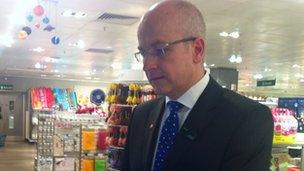The best way to complain
- Published

What can customers do?
We have all done it. Paid good money for bad service, and felt frustrated.
Nowadays 76% of people are likely to complain about it.
But what is the best way to do it?
The Institute of Customer Service asks 26,000 people, twice a year, about the quality of customer service in the UK.
It says people tend to find "putting it in writing" the least satisfying approach, rated by respondents at 68 out of 100.
Phoning scores slightly higher, at 74 out of 100.
But the most popular approaches are doing it on the web (scored 79 out of 100) or in person (80 out of 100).
<bold>'Worst bank ever'</bold>
Now, NatWest has experienced this first hand.
The bank admits a large number of its 7.5 million personal banking customers have been affected by a technical problem that has caused payment problems.
Customers were quick to take to social networks to tweet their frustration.
One wrote: "This is beyond a joke now,i need my money! i ave kids 2 feed an rent 2 pay."
Others were even angrier, one saying: "@NatWest_Help you are the worst bank i have ever, EVER encountered. ridiculous."
The bank has responded regularly, with comments such as: "We can assure our customers that this problem is strictly of a technical nature and will be fixed as soon as possible" and "Again we apologise to our customers for this unacceptable inconvenience."
It even posted up examples of negative feedback on its own website, including one person saying: "Just switched to a competitor. This is inexcusable."
Vital feedback
John Lewis is one company that seems to be getting it right.

Simon Fowler says John Lewis takes customer feedback incredibly seriously
It scored fifth in a list of organisations customers were satisfied with.
Simon Fowler is the managing director of the branch on Oxford Street in London, and says social media is very important.
"As well as having our own Facebook site, we're monitoring all the social media networks through our own people, just to make sure that we're listening to all sorts of feedback and reacting accordingly," Mr Fowler said.
"So it's an area we're having to keep a very close eye on, and it's helping us to develop the way in which we run our business."
Power balance
Jo Causon, chief executive of the Institute of Customer Service, says technology has shifted the power balance back to the consumer.

Jo Causon offers three top tips for complaining
"Social media has really changed the whole landscape, because now it is immediate and very visible," she argues.
"So if you and I actually complain, rather than it being just to my friend, or my neighbour or my husband, now that's actually over the whole of the world."
She says this forces businesses to respond as quickly as possible.
But her advice is not to rule out more traditional approaches and use the method appropriate to the first conversation or contact with the company.
"So if I'd bought it online, I'd go back online. If I bought the object in a shop or face-to-face, I'd go back through that particular route," she says.
"There isn't a best way to complain, the important thing is that you do," she points out.
She says that overall, customer satisfaction has gone up over the last three years, but the main gripes are about organisations not keeping their promises, staff attitude, or the quality of the product.
She has three main tips for getting a good result.
"Firstly, be clear about what you're complaining about. Secondly, be calm and look for resolution, be clear about what you want," she says.
"And thirdly, if you don't get your complaint answered, escalate it."
No matter how people choose to do it, companies need to pay attention to complaints.
Research shows two-thirds of us will not use a business again after a bad experience.